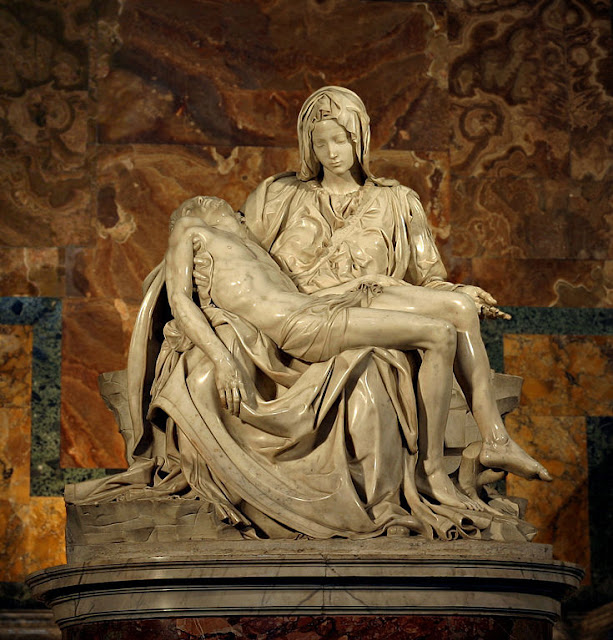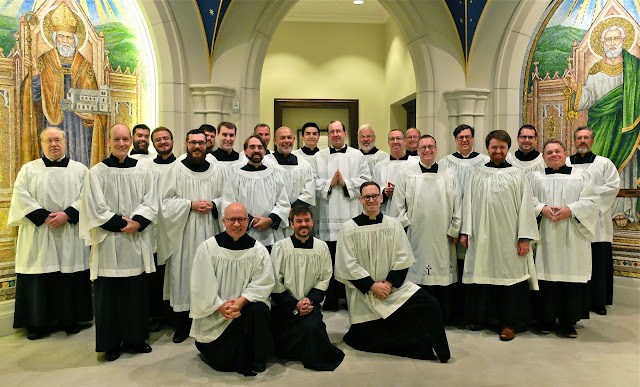Shhh! Don't tell anyone about the Ordinariate and the beauty of Divine Worship.
The Mass, celebrated reverently, attracts. The unchurched, disillusioned diocesans and reverts are finding their way to worship God in the beauty of holiness with the Ordinariate communities of the Anglican Patrimony.
What does that mean, 'the Mass attracts'? It means that the Holy Ghost acting in and through the Sacred Liturgy reveals the truth, goodness and beauty of God that all men seek, the truth and beauty and goodness that draws individuals and families into a more profound communion with God. When Mass is celebrated with due reverence for God's sublime gift, the Mass becomes a clear window through which the Holy Ghost manifests the glory of God to His people: truth, goodness and beauty.
When parishes sell the Mass as entertainment by offering, for example, cheap pop music rife with heterodox texts, or reduce the Mass to a caricature of the Sacrifice of Christ by ignoring the very nature of the sacred Liturgy, or politicize the Mass by subjecting it to some ideological rampage, they might as well be saying 'forget about God, look at us!'
As a convert received into the Catholic Church in the mid-1980s, I, like so many other Catholics starved by a diet of liturgical pablum, am blessed to have survived those long years of outrageous liturgies. I am grateful to God for granting me enough days to witness the advent of Divine Worship, the Ordinariate form of the Mass, which offers:
- a personal encounter and communion with God and His Church. Ordinariate Catholics do not imagine themselves to be the manufacturers of grace. Rather, in humility and deference to the will of God, there is a strong sense of duty, of responsibility to celebrate the mysteries (sacraments) with care and attention, mindful that God is the One Who acts in and through the sacraments.
- pause for prayer. The Ordinariate Mass, like the Extraordinary Form, is not a run-on sentence. It is punctuated with silence to allow people to invest themselves in a personal way, to dispose themselves to the movement of grace as each person is called by God.
- elegance. The Ordinariate Mass is not dumbed down nor stripped of poetry. The language of prayer is delectable and entices hearts and minds into conversation with God. The Ordinariate Mass offers a banquet of beautiful prayers set to glorious music to unite the congregation in heaven-directed praise and adoration.
- authentic spiritual formation. The worshipper is enticed into a loving friendship with the Holy Trinity. We are invited to sit at the feet of Jesus, the Mother of God and the saints, to enter into the wisdom of God, to feast on the word of God and to receive the very Body and Blood of Jesus Christ unto our eternal health and salvation. We are reminded that we are sinners loved by God; we need His grace to sustain us in hope. In the Ordinariate Mass we are shaped by truth and mercy, love and forgiveness. Because we meet God on His terms, we are able to acknowledge our dignity as children of God created in the image and likeness of God.
- consolation and peace that only God can give. To be present in the Mass is to know how much God loves us. By entering into the embrace of the Father and the Son in the Holy Spirit, we share in the peace of the Holy Trinity. That peace extends into the fellowship offered after Mass. A spirituality of hospitality bequeathed in and through the Anglican Patrimony is a vital part of the Ordinariate experience. Having feasted upon the Body and Blood of Christ, we see with renewed vision our communion with God, a communion that welcomes the stranger and affirms our identity as persons created in the image and likeness of God. The time of fellowship after Mass is an extension of the Mass, our participation in the abiding Presence of Christ Who we see in our sisters and brothers, the Body of the Christ, the Church.
- participation in the mission of Christ and the call to unity in the truth. Divine Worship, the Mass of the Personal Ordinariates of the Anglican Patrimony in communion with the Church founded by Jesus, calls us to unity. The Mass is the forum for authentic diversity and unity in the Truth. All are invited into communion with Jesus and His Church. An article by Emilie Ng in the Catholic Leader captures the reality of the Ordinariate: (T)he Personal Ordinariate is the first real example of true Christian unity and ecumenism.“I have no doubt that if you read the Decree on Ecumenism (Unitatis Redintegratio) that actually the ordinariate is the first occasion where that vision of that document has been fulfilled,” Msgr Newton said. “When people are looking for what ecumenism really is, here it is, in a living form.”

.jpg)





Comments
Post a Comment
Your comments will be appreciated and posted if 1) they are on topic and 2) preserve decorum.
Stand by your word.